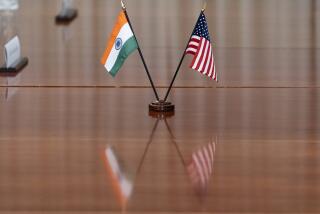Use Leverage on Pakistan While We Can
- Share via
The Indian Airlines hijacking ordeal has vividly dramatized why the United States should stop coddling the military regime in Pakistan and use its economic leverage to promote an early return to civilian rule.
Islamabad’s ruling junta is deeply divided between its front man, Gen. Pervez Musharraf, and two more powerful generals with long-standing ties to the Pakistan-based Islamic fundamentalist group responsible for the hijacking: Lt. Gen. Mohammed Aziz, chief of the general staff, and Lt. Gen. Mahmoud Ahmed, director of Inter-Services Intelligence, or ISI.
Despite detailed evidence presented by India, there is no smoking gun to prove that the Pakistani government staged the hijacking. It is clear, however, that the increasing power of fundamentalist sympathizers in the military leadership enables Islamic extremists to operate in Pakistan with impunity.
Pakistani cleric Maulana Masood Azhar, one of the prisoners released by India to resolve the crisis, revealed that the fugitive hijackers are now in Kashmir, which means that they traveled there through Pakistan after their release in Afghanistan. Azhar openly called for “death to America and India.”
So long as the armed forces retain absolute control, Islamic extremists will wield power out of all proportion to their real influence in Pakistani society. This means that Pakistan will continue to oppose American interests in South Asia, and support Taliban rule in Afghanistan as well as militant Kashmiri insurgent factions opposed to a political accommodation with India based on Kashmiri autonomy. The U.S. will then be increasingly tempted to make a devil’s bargain with Islamabad, offering military aid and other inducements for Pakistani help in getting Afghanistan to turn over terrorist leader Osama bin Laden. This would undermine the promising U.S. effort now underway to improve relations with India, an emerging power eight times bigger than Pakistan.
The danger that Aziz and Ahmed will elbow Musharraf aside is growing. After the army staged its coup, Musharraf demoted Aziz to a corps command, but was forced to back down when Aziz resisted. Musharraf is an Urdu-speaking refugee from India with no ethnic base in Pakistan. Aziz speaks Punjabi, the language of Pakistan’s dominant Punjab province, and is a leader of the martial Sudhan clan, which controls the Poonch district of the Pakistani-controlled half of Kashmir.
It was Aziz, with his roots in Kashmir and a long record of military service there, who masterminded the invasion of the Kargil area on the Indian side of the Kashmir cease-fire line early in 1999, triggering a dangerous confrontation with New Delhi. During and after the Afghan war, he directed the ISI’s activities in Afghanistan, setting up the training camps of the Harkat Moujahedeen, the group responsible for the hijacking.
When Musharraf, Aziz and Ahmed first took over, the United States had high hopes that the new regime would take bold action to rescue the collapsing Pakistani economy. For this reason, Washington has made no effort to pin them down on a timetable for the restoration of civilian rule. In December, the United States agreed to reschedule $950 million in Pakistani debts to the U.S., a step that eases the way for the International Monetary Fund to release a pending $250-million installment of its $1.32-billion rescue package for Pakistan.
It is now increasingly clear that U.S. hopes for effective economic leadership were unfounded. On controversial fiscal measures such as tightened tax collections and the imposition of a sales tax, the junta has proved to be vacillating and indecisive. Meanwhile, the economic situation continues to deteriorate, and the regime is using its unchecked power to silence critics.
Given Islamabad’s desperate need for IMF aid, the U.S. has enormous leverage. Washington should insist on a clear timetable for a return to constitutional, civilian and democratic government as the precondition for U.S. support of further aid from international financial institutions. On his projected trip to South Asia, President Clinton should not visit Pakistan unless a timetable is announced. The president should not authorize further military sales to Pakistan that would undercut relations with India. Islamabad has received $293 million in U.S. military sales during the past three years.
History has shown that military regimes in Islamabad have not only been just as corrupt as civilian governments but have invariably relied on tensions with India to fortify their domestic control. The few limited breakthroughs that have been made in Indo-Pakistan relations have come during periods of civilian rule. Similarly, it is military governments that have been primarily responsible for Pakistani support of Afghan fundamentalist factions.
Islamic extremists never have done well in Pakistan at the polls, but they are likely to grow progressively stronger in the streets as disenchantment with the military regime deepens. In a polarized confrontation between the generals and a disorganized opposition, fundamentalist strength will be artificially inflated. Moving to a new elected leadership offers the last, best hope to consolidate secular resistance to a fundamentalist takeover and to defuse regional tensions. Indefinite military rule is the road to internal chaos and another Indo-Pakistan war.
More to Read
Sign up for Essential California
The most important California stories and recommendations in your inbox every morning.
You may occasionally receive promotional content from the Los Angeles Times.










